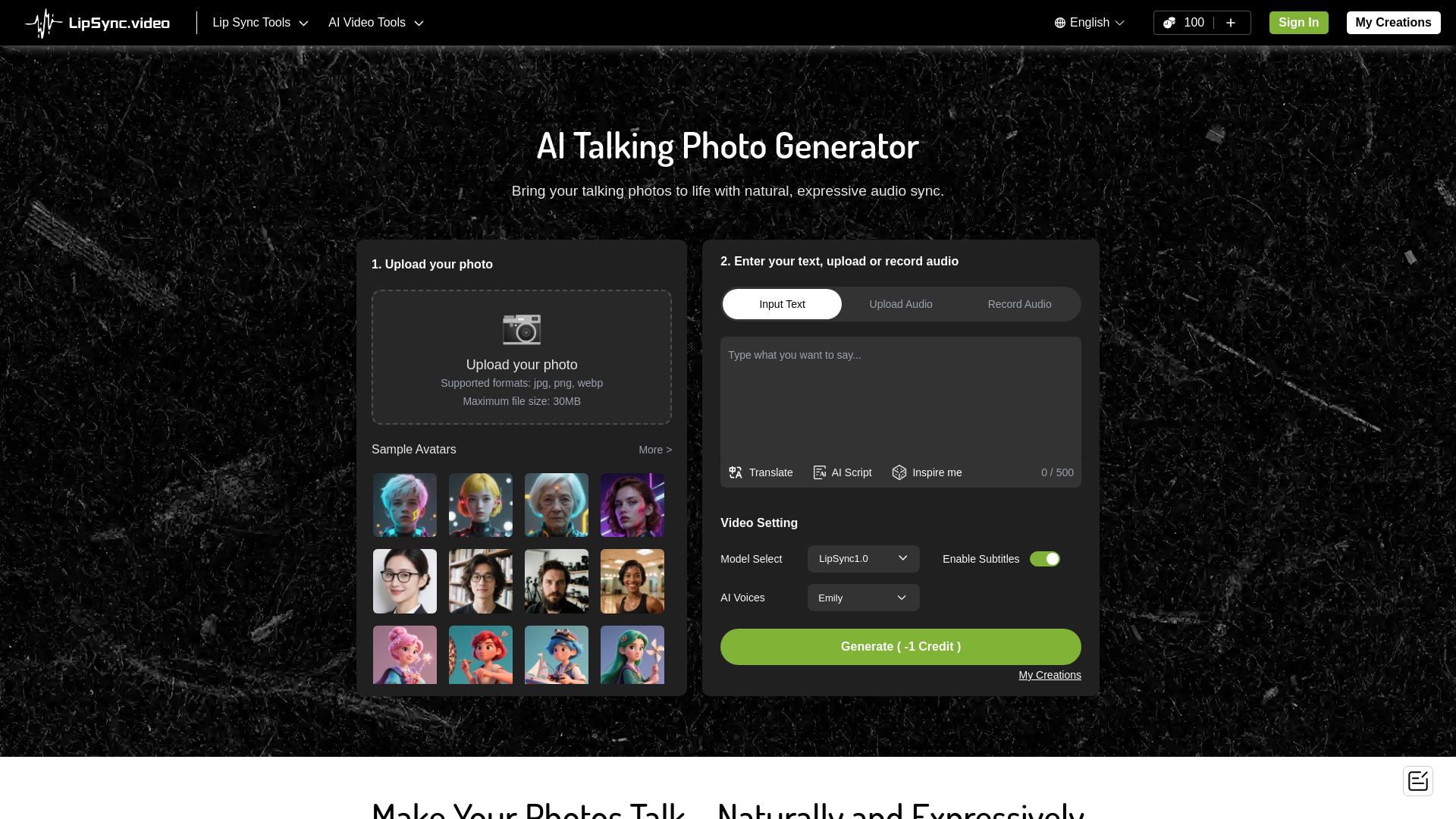- Home
- AI Text-to-Speech
- AI Talking Photo Generator - LipSync

AI Talking Photo Generator - LipSync
Open Website-
Tool Introduction:Animate photos into lip‑synced talking videos with AI‑driven expressions.
-
Inclusion Date:Oct 28, 2025
-
Social Media & Email:
Tool Information
What is AI Talking Photo Generator - LipSync
AI Talking Photo Generator - LipSync is an AI-powered tool that turns still photos into natural, speaking portraits. It detects facial landmarks and synthesizes frame-accurate lip movements synchronized with audio, while adding micro-expressions, eye blinks, and subtle head motion. Users upload a photo and a voice track or text-to-speech, then export a ready-to-share clip for social posts, e-learning, product explainers, or support avatars. The core value is rapid, low-cost character videos without cameras, actors, or manual animation.
AI Talking Photo Generator - LipSync Features
- Precision lip-sync: Phoneme-level alignment generates mouth shapes that track speech timing for believable dialogue.
- Expressive facial animation: Controls for emotion, blink rate, eye gaze, and subtle head movement enhance realism.
- Audio flexibility: Upload recorded voice, use built-in text-to-speech, or import studio tracks.
- Multilingual support: Create talking photos in many languages for localization and global campaigns.
- Voice options: Choose from synthetic voices or bring your own; adjustable tone, speed, and style.
- Quality safeguards: Face detection, framing guides, and upscaling help improve results from varied images.
- Subtitle and captions: Auto-generate or upload subtitles to improve accessibility and engagement.
- Branding and layout: Add backgrounds, logos, and canvas sizes suited for Reels, Shorts, or slides.
- Batch and templates: Reuse scenes and process many photos or scripts at once for scale.
- Export options: Render MP4/WebM in multiple resolutions and aspect ratios, with optional watermarking.
- API/SDK availability: Integrate talking photo generation into apps, chatbots, or CMS workflows.
- Privacy controls: Project-level permissions, consent prompts, and secure media handling.
Who should use AI Talking Photo Generator - LipSync
This tool suits content creators, social media managers, educators, marketers, product teams, and support leaders who need quick spokesperson-style videos from static images. it's ideal for micro-learning lessons, product explainers, localized promos, onboarding guides, FAQ avatars, and community updates—especially when budgets, time, or filming resources are limited.
How to use AI Talking Photo Generator - LipSync
- Prepare a high-quality, front-facing photo with good lighting, a single unobstructed face, and minimal background clutter.
- Upload the image and choose your audio source: record voice, upload a file, or generate speech with built-in TTS.
- Select language, voice, and speaking style; set emotion intensity, pace, and optional blink/gaze preferences.
- Paste or upload the script; check duration to ensure audio length matches the desired video runtime.
- Customize the canvas (aspect ratio, background, logo) and enable captions if needed.
- Preview the animation; fine-tune timing, expression, or retake audio for clarity.
- Export the final video in your preferred resolution and format, then publish or embed.
AI Talking Photo Generator - LipSync Industry Use Cases
E-learning teams convert instructor photos into short lessons with multilingual narration; marketers generate talking spokespersons for product launches and A/B test variants; customer support deploys avatar introductions for FAQs and onboarding flows; localization teams quickly dub product tours into new languages; HR and internal comms produce policy updates without filming; museums and real estate create narrated exhibits or property introductions from archival or listing photos.
AI Talking Photo Generator - LipSync Pricing
Pricing models vary by provider. Many tools in this category offer a free or trial tier (often with watermarks or usage limits), subscription plans with higher render limits and premium voices, pay-as-you-go credits for occasional use, and custom enterprise plans with API access, SSO, and SLA support.
AI Talking Photo Generator - LipSync Pros and Cons
Pros:
- Fast, cost-effective production of speaking portraits from still images.
- High-quality lip-sync with controllable expressions and gaze.
- Multilingual output for efficient localization at scale.
- Simple workflow and templates suitable for non-experts.
- API integration for automated or programmatic video generation.
- Consistent branding across many short-form videos.
Cons:
- May exhibit uncanny results with low-quality or profile-angled photos.
- Limited head/body motion compared to full 3D animation or live filming.
- Audio quality and script pacing strongly affect realism.
- Requires image rights and consent; ethical use and privacy must be managed.
- Free tiers may include watermarks or lower resolution outputs.
AI Talking Photo Generator - LipSync FAQs
-
What kind of photo produces the best results?
Use a high-resolution, front-facing portrait with even lighting, a neutral or slight smile, and no obstructions (no heavy shadows, masks, or sunglasses). Ensure only one face is prominent.
-
Can it handle different languages and accents?
Yes. With multilingual TTS or uploaded audio, the system synchronizes lip movements to phonemes across many languages and accents.
-
Is commercial use allowed?
Commercial use depends on the provider’s license and your rights to the image and audio. Obtain consent from depicted individuals and review terms before publishing.
-
How long can the generated videos be?
Length is typically tied to the audio duration. Short clips (e.g., 5–60 seconds) render fastest; some providers support longer videos on paid plans.
-
How can I improve realism?
Use clean audio without background noise, keep script pacing natural, choose an appropriate voice style, and avoid extreme head angles. Fine-tune expression and blink settings in preview.
-
Is there an API to automate workflows?
Many platforms offer REST APIs or SDKs for bulk rendering, localization pipelines, and chatbot avatars; check provider documentation for endpoints and limits.
